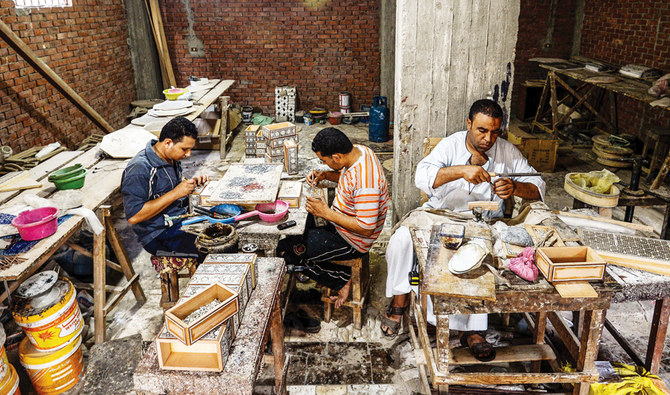DAMIETTA: Egypt has built a multi-billion-pound “furniture city” near the mouth of the Nile, a pilot for a series of industry mega-hubs it wants to throw up across the nation, but it could face a struggle to populate it.
The sprawling industrial park, inaugurated in December, is 10 km (6 miles) outside the port city of Damietta, long the center of Egypt’s once-flourishing but now languishing furniture trade.
The aim of the 3.6 billion pound ($230 million) project, and the other planned specialized parks, is to boost economic growth and create jobs badly needed in a country where about a third of the 100 million people live in poverty.
The idea is “to gather all the furniture makers and workshop owners to increase production and exports,” said Bassem Nabil, chief executive of the Damietta Furniture City.
However only 400 of the 1,400 newly built workshops have been sold so far.
“There is not a worker among us who will go to that city over there,” said Othman Khalifa, the owner of a carpentry workshop in an old neighborhood of Damietta. “They should have first come and consulted the people.”
At least half a dozen craftsmen who spoke to Reuters said they would not move to the new city, citing the proximity of their current workshops to their homes and, at 300,000 pounds to be paid over 10 years to buy a workshop, the relatively high costs of being based in the new city.
“What’s in it for us?” asked one, who declined to be named.
However Osama Saleh, chairman of the state investment firm Ayady, which helped lead the project, pointed out that it was still early days. He said the new city hoped to sell the remaining 1,000 workshops over the next two years and predicted the city would create 100,000 jobs within four years.
Saleh, also chairman of the furniture city, said the park had space for 157 big factories too.
Aesthetically, the new park is a far cry from Damietta’s traditional furniture quarter, where workshops lie in a dense warren of narrow lanes, often directly under the apartments of their owners and amid the din of table saws and machine lathes. Sawdust and scraps of wood lie scattered about.
The furniture city stretches for 1.39 million square meters, filled with beige and orange concrete workshops trimmed with aluminum siding, resembling car garages built side-by-side.
At the inauguration ceremony in December, President Abdel-Fattah El-Sisi had himself expressed surprise that demand for workshops was not stronger.
The furniture industry has been in decline for some 20 or 30 years, hit by changing tastes and cheaper imports from Turkey and China, as well as depressed consumer spending.
“Hey, people of Damietta. Don’t you have dreams?” El-Sisi asked. “What you are seeing here is a dream I have had for many long years.”
“I had thought the 1,300 or 1,400 (workshops) here, that we would need yet another 2,000. People are telling me the market is a bit slow and we are facing problems.”
El-Sisi said he was trying to tackle the problems.

An Egyptian craftsman makes wooden frames from date palm leaves. Despite government initiatives, the furniture industry has been in decline. (Shutterstock)
The park remains sparsely populated, however, and during a visit Reuters saw only a handful of workshops up and running.
Saleh said most of the old city’s 30,000 workshops would remain in place and the new city would help them with advice and training.
Egypt needs to absorb more than 3.5 million new entrants to the labor market over the next five years due to its burgeoning population, according to the International Monetary Fund.
To do this it will need to accelerate growth to 7.5 percent, above the 5.6 percent it recorded in the second half of 2019, some economists say.
By building the industrial park, the government hopes to aid growth by reigniting success in the furniture industry.
Furniture makers in Damietta, in the western delta near the Mediterranean coast, had been a favorite among Egyptians for many decades, famed for highly ornate and gilded pieces reminiscent of French furniture of the 18th and 19th centuries.
The new furniture city, three years in the making, opened at a particularly inauspicious time: Toward the end of a three-year IMF program whose austerity measures drained consumer spending power and dampened demand for furniture.
Much is riding on its fate, however.
If successful, it will serve as a prototype for a series of parks focused on different industries in more than two dozen provinces, said Saleh. “We will study the comparative advantage in each governorate and see how we can invest in them.”
Saleh said the furniture city, near two major ports, would provide training, technical and marketing support to craftsmen and furniture producers. It would also ensure that companies relocating there pay taxes and social insurance for workers.
Recent Egyptian history instils little confidence though. It is littered with unproductive attempts to establish industrial parks, often far out in the desert and based on top-down decision making, with little consultation with the entrepreneurs and workers expected to relocate there, economists say.
Among the parks now struggling is Technology Valley (Wadi Technologia), designed in 1994 to house 400,000 people in the desert east of Ismailia but still largely empty.
Another is Robbiki Leather City, founded in 2015 in the desert 55km east of the central Cairo neighborhood that once housed the country’s tanning industry, which has had a slow start, according to media reports.
But David Sims, a Cairo-based urban economist, said the new furniture city’s proximity to Damietta gave it a better chance of success than some industrial parks that had gone before.
“It’s distant, but not too distant,” he said. “Distance is an obstacle, but not too much in comparison to the leather city 55km away.”


























